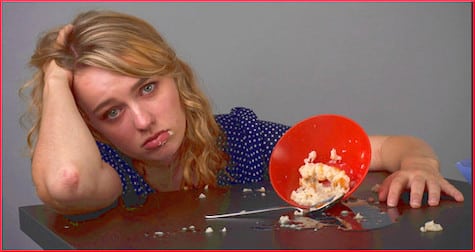
BWL, or Behavioral Weight Loss programs, are those that concentrate on diet and/or exercise. In other words, the same kind we have had all along.
According to tradition, “energy balance” is the only factor at work. Calories are taken in through eating and burned through exercise, and nothing else is going on. It is behavioral, because the patients are exhorted and expected to engage in certain behaviors, i.e. to abstain from the wrong foods, and to perform enough physical activity to cancel out the potential weight gain from the foods they do eat.
BED is Binge Eating Disorder, and CBT is Cognitive Behavioral Therapy. Research published in 2011 did its best to explain the intricate and complicated relationship between the three sets of initials.
In dealing with BED, Behavioral Weight Loss treatment was shown to produce modest but recognizable weight loss. But Cognitive Behavioral Therapy got better results during the 12-month followup period. So, long-term, “the efficacy of behavioral weight loss (BWL) in obese patients with BED is uncertain.”
Short-term, BWL can achieve a bit of weight loss. Long-term, CBT results in fewer eating binges, but does not produce noticeable weight loss.
Although CBT generally produces remission rates of 40% to 60% and robust improvements in eating disorder psychopathology it fails to produce weight loss.
So, the behavior of binge eating can be changed, but that change doesn’t really bring about the results that it might be logically assumed to obtain. But then, we find out that even those conclusions rest on a wobbly base, because, as we have discussed, whenever self-reporting is an element of a study, doubt creeps in:
The existing literature of behavioral-weight-loss (BWL) for BED is equivocal and difficult to interpret in light of significant methodological shortcomings, particularly the reliance on self-report questionnaires for the assessment of binge-eating… Weight loss has generally been an elusive outcome in treatment studies for BED, including most studies testing BWL for obese patients with BED.
A study published several years later states this another way:
Cognitive behavioral therapy (CBT) is traditionally recognized as the best established treatment for binge eating disorder and the most preferred intervention for obesity, and could be considered as the first-line treatment among psychological approaches, especially in a long-term perspective; however, it does not necessarily produce a successful weight loss.
Strip this to the bare bones. “CBT […] most preferred intervention for obesity… does not necessarily produce a successful weight loss.” This is confusing. What is the point of an obesity intervention, if not successful weight loss?
But then, these authors offer hope, the hope found in synergy. A methodology that is maybe not so spectacular in itself can team up with others, and their combined forces can bring about impressive results. The researchers describe how behavioral therapy for weight loss evolved from a behavior-centered approach toward a more cognitive attitude, and finally to the notion of multicomponent treatment.
This is quite sensible. If the causes of obesity are multi-factorial, why shouldn’t the treatment be multi-factorial also? The authors go on to say:
Modern lifestyle modification programs have three main components: dietary recommendations; physical activity recommendations; and cognitive-behavioral therapy to address weight loss and weight maintenance obstacles…
Those weight maintenance obstacles are the subject next time.
Your responses and feedback are welcome!
Source: “Cognitive-behavioral therapy, behavioral weight loss, and sequential treatment for obese patients with binge-eating disorder: a randomized controlled trial,” NIH.gov, October 2011
Source: “Cognitive behavioral therapy to aid weight loss in obese patients: current perspectives,” NIH.gov, 06/06/17
Photo credit: Daniela Brown Photography on Visualhunt/CC BY-ND

 FAQs and Media Requests:
FAQs and Media Requests: 











